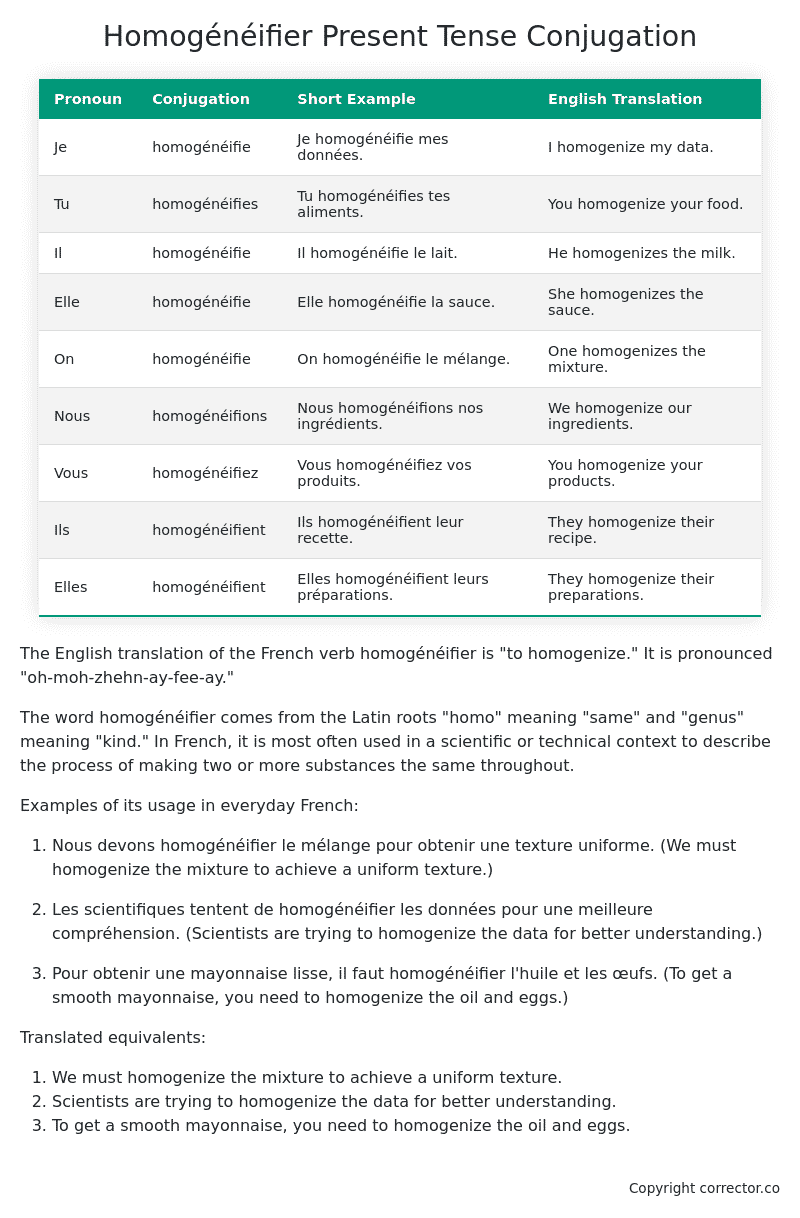Le Present (Present Tense) Conjugation of the French Verb homogénéifier
Introduction to the verb homogénéifier
The English translation of the French verb homogénéifier is “to homogenize.” It is pronounced “oh-moh-zhehn-ay-fee-ay.”
The word homogénéifier comes from the Latin roots “homo” meaning “same” and “genus” meaning “kind.” In French, it is most often used in a scientific or technical context to describe the process of making two or more substances the same throughout.
Examples of its usage in everyday French:
-
Nous devons homogénéifier le mélange pour obtenir une texture uniforme. (We must homogenize the mixture to achieve a uniform texture.)
-
Les scientifiques tentent de homogénéifier les données pour une meilleure compréhension. (Scientists are trying to homogenize the data for better understanding.)
-
Pour obtenir une mayonnaise lisse, il faut homogénéifier l’huile et les œufs. (To get a smooth mayonnaise, you need to homogenize the oil and eggs.)
Translated equivalents:
- We must homogenize the mixture to achieve a uniform texture.
- Scientists are trying to homogenize the data for better understanding.
- To get a smooth mayonnaise, you need to homogenize the oil and eggs.
Homogénéifier – About the French Present Tense
To take a deep dive into all the French tenses then see our article on Mastering French Tense Conjugation.
Common Everyday Usage Patterns For Le Present
Interactions with Other Tenses
Table of the Present Tense Conjugation of homogénéifier
| Pronoun | Conjugation | Short Example | English Translation |
|---|---|---|---|
| Je | homogénéifie | Je homogénéifie mes données. | I homogenize my data. |
| Tu | homogénéifies | Tu homogénéifies tes aliments. | You homogenize your food. |
| Il | homogénéifie | Il homogénéifie le lait. | He homogenizes the milk. |
| Elle | homogénéifie | Elle homogénéifie la sauce. | She homogenizes the sauce. |
| On | homogénéifie | On homogénéifie le mélange. | One homogenizes the mixture. |
| Nous | homogénéifions | Nous homogénéifions nos ingrédients. | We homogenize our ingredients. |
| Vous | homogénéifiez | Vous homogénéifiez vos produits. | You homogenize your products. |
| Ils | homogénéifient | Ils homogénéifient leur recette. | They homogenize their recipe. |
| Elles | homogénéifient | Elles homogénéifient leurs préparations. | They homogenize their preparations. |
Other Conjugations for Homogénéifier.
Le Present (Present Tense) Conjugation of the French Verb homogénéifier (this article)
Imparfait (Imperfect) Tense Conjugation of the French Verb homogénéifier
Passé Simple (Simple Past) Tense Conjugation of the French Verb homogénéifier
Passé Composé (Present Perfect) Tense Conjugation of the French Verb homogénéifier
Futur Simple (Simple Future) Tense Conjugation of the French Verb homogénéifier
Futur Proche (Near Future) Tense Conjugation of the French Verb homogénéifier
Plus-que-parfait (Pluperfect) Tense Conjugation of the French Verb homogénéifier
Passé Antérieur (Past Anterior) Tense Conjugation of the French Verb homogénéifier
Futur Antérieur (Future Anterior) Tense Conjugation of the French Verb homogénéifier
Subjonctif Présent (Subjunctive Present) Tense Conjugation of the French Verb homogénéifier
Subjonctif Passé (Subjunctive Past) Tense Conjugation of the French Verb homogénéifier
Subjonctif Imparfait (Subjunctive Imperfect) Tense Conjugation of the French Verb homogénéifier
Conditionnel Présent (Conditional Present) Tense Conjugation of the French Verb homogénéifier
Conditionnel Passé (Conditional Past) Tense Conjugation of the French Verb homogénéifier
L’impératif Présent (Imperative Present) Tense Conjugation of the French Verb homogénéifier
L’infinitif Présent (Infinitive Present) Tense Conjugation of the French Verb homogénéifier
Struggling with French verbs or the language in general? Why not use our free French Grammar Checker – no registration required!
Get a FREE Download Study Sheet of this Conjugation 🔥
Simply right click the image below, click “save image” and get your free reference for the homogénéifier Present Tense tense conjugation!

I hope you enjoyed this article on the verb homogénéifier. Still in a learning mood? Check out another TOTALLY random French verb present conjugation!


